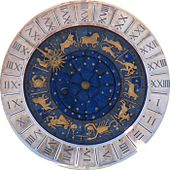Moon (astrology)
| Astrology |
|---|
 |
| Background |
| Traditions |
| Branches |
| Astrological signs |
| Symbols |
Western Astrology
In Western astrology The Moon is said to represent the feeling nature of the individual. It is used to characterise the inner child within us, as well as the past and how we have been as individuals rather than how we are now. It is also used to represent the perception one has of one's mother, so someone with a Pisces Moon would be more likely to see their mother as a Piscean type, even if in reality that was not the case. In the horoscope the aspects the moon makes with other planets and the transits the slower moving planets make to the moon are all said to have a strong impact on how our lives unfold.
The moon is also said to represent receptivity, vulnerability, etc. but this should not suggest that its power is considered less than the sun's. From an astrological perspective (in which we assume, for the sake of argument, that the earth is fixed and everything else moves) the sun and moon are the same size. From an astrological perspective, they are equals; a solar eclipse reminds us of this so that we do not doubt the power of the moon, which is hidden and mysterious but no less influential.
Eastern Astrology
In Chinese cosmogony the moon is typically said to be identified with the feminine principle, the yin. This may be because a woman's menstrual cycle roughly corresponds to one lunar month that is of 29 or 30 days.
In Chinese culture, the sun and the moon, or yang and yin, are said to represent the masculine and the feminine, respectively. One way to think about the interaction of the sun and moon signs in one particular person's horoscope is Jung's theory of the anima/animus, which is very similar to the Chinese idea that every human being should strive to balance the yang and the yin, or the masculine and the feminine, in her/his own personality and life.
See also
